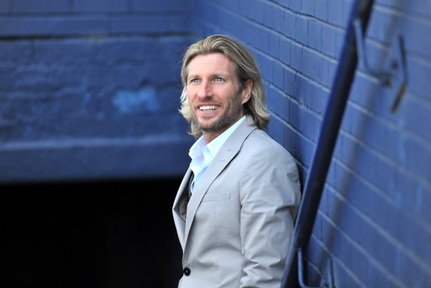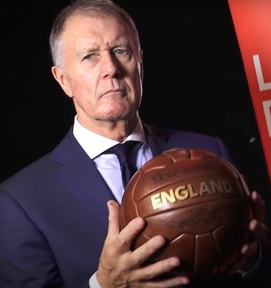Robbie Savage backs new campaign to tackle dementia in football
Alzheimer’s Society ambassador Robbie Savage is backing a new campaign Sport United Against Dementia to bring football clubs and football bodies together in a concerted effort to tackle dementia on and off the field.

The charity is calling for the football world to come together and work with Alzheimer’s Society to support past and present football players, as well as their families and fans affected by dementia.
Their aim is to get the very best support available, including being referred to Alzheimer’s Society right at the point of diagnosis.
The Sport United Against Dementia campaign is a significant step in progressing research with links found between the risk of developing dementia and playing contact sports or heading footballs.
In 2020 alone, England lost two of its great footballing heroes with Jack Charlton and Nobby Stiles both diagnosed with dementia before their deaths.
It has also been reported recently that Jack's brother Sir Bobby Charlton has also been diagnosed with dementia.
'With so many footballing heroes affected by dementia, I couldn’t sit back'
Backing the campaign is Alzheimer’s Society’s ambassador Robbie Savage, who lost his dad, Colin, to Pick’s disease, a rare form of dementia when he was just 64 years old.
Mr Savage said: “My dad was my hero and was struck down by dementia in his prime, it was absolutely devastating for the whole family. I’ve been an ambassador for Alzheimer’s Society for a decade and with so many of our footballing heroes having also been affected by dementia, I couldn’t just sit back and not act.”
The former footballer is a director of football for Macclesfield FC and the club has chosen Alzheimer’s Society as its official charity partner, making a commitment to raise further awareness and funds towards Sport United Against Dementia.
“We fully support the charity’s efforts to call for more research and raise funds and awareness of Alzheimer’s Society’s vital support services, which need to be offered to more players and fans who are facing a difficult journey ahead,” says Mr Savage.
'Players should be getting substantial support and care now'
Concerns about the risk of dementia in footballers, and those who have headed the ball frequently, have risen significantly in recent years.
Last year a study by the University of Glasgow, funded by the Football Association and the Professional Footballers’ Association, found former professionals over the age of 50 had an approximately three-and-a-half-times higher rate of neurodegenerative disease than expected.
Consultant neuropathologist from Glasgow University, Dr Willie Stewart, believes dementia is affecting modern-day footballers and thousands of footballers globally could be living with dementia.
Dr Stewart told BBC Sport: "Modern-day footballers have far better cardiovascular health, far better cancer outcomes, better mental health but they have dreadful outcomes with degenerative brain disease.
"FIFA and Scottish FA have tried to make adjustments to improve the game and reduce the risk but there has been silence from FIFA and the global game.
"In the meantime, there's been hundreds, maybe thousands of footballers who have suffered with it, and football has deliberately, in my opinion, not dealt with it because it will cost money and affect the brand.
"The research should continue, there is plenty of money to do it, to make sure that current players and youngsters coming through don't suffer the same fate as my father.
"But more importantly, players should be getting care and support now, substantial support and care.”
'We hope the industry will come out in force to unite against dementia'
According to Alzheimer's Society, there are currently around 850,000 people with dementia in the UK and this is projected to rise to 1.6 million by 2040.
Kate Lee, chief executive at Alzheimer’s Society: “We’re hugely grateful to our ambassador Robbie Savage and everyone at Macclesfield FC for lending their support to Sport United Against Dementia.
“I’m really excited to launch our Sport United Against Dementia campaign, seeking to spearhead change by making sure that the very best support is available to all sportspeople.
“As the leading dementia charity, we hope the industry will embrace the team spirit that has helped win cups, trophies and medals and come out in force to unite against dementia.”
In 2020, Alzheimer’s Society has seen a significant shortfall in income with the pandemic. Loneliness and isolation has affected hundreds of thousands of people with dementia and their families, as a result of a lack of social contact and interruptions to essential care and support.
Ms Lee added: “We urgently need more answers and support for the sporting community where dementia is concerned. We look forward to working closely with Macclesfield FC over the coming months and are excited to see what difference we can make for players and fans alike.”
Sir Geoff Hurst has offered to donate his own brain for dementia research
Sir Geoff Hurst has offered to donate his own brain for dementia research after seeing former football legends Nobby Stiles and Jack Charlton lose their lives to dementia.

The former England striker, 78, is one of only four members of the World Cup-winning team alive and believes more must be done to combat dementia and Alzheimer’s disease which has been closely associated with heading footballs.
When asked if he would donate his own brain for research, Sir Hurst told The Mirror: “Yes, absolutely. Jeff Astle has done it through his daughter Dawn and someone else doing that is good.
“Anything that can help must be looked at very seriously and because of my involvement with dementia and Alzheimer’s, I will do anything to try and help with this terrible illness.”
Sir Hurst also believes children should not be heading footballs.
He said: “I think kids heading the ball now when their brains are not fully developed or have fully matured and that is obviously a very serious and sensitive issue that’s got to be addressed as well.
“I think stopping at that young age, when the brain has not matured like an adult, must be looked at. I don’t think it would destroy the enjoyment of kids’ football or grassroots football. That would be a very strong and sensible suggestion.”
Latest News
 29-Jul-24
Dementia Bus gives carehome.co.uk staff insight into life with dementia
29-Jul-24
Dementia Bus gives carehome.co.uk staff insight into life with dementia
 27-Jul-23
UK's top home care agencies in 2023 revealed
27-Jul-23
UK's top home care agencies in 2023 revealed
 30-Nov-22
A quarter of older people keep their falls secret from family
30-Nov-22
A quarter of older people keep their falls secret from family
 29-Nov-22
'Covid-19 has not gone away' say terminally ill
29-Nov-22
'Covid-19 has not gone away' say terminally ill
 28-Nov-22
IT consultant who received poor care opens 'compassionate' home care business
28-Nov-22
IT consultant who received poor care opens 'compassionate' home care business